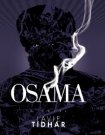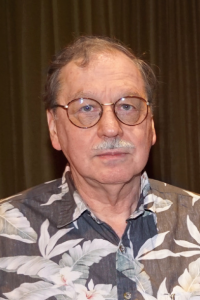Lavie Tidhar: Stranger than Pulp
 Lavie Tidhar was born November 16, 1976 and raised on a kibbutz in Israel. He has traveled extensively since he was a teenager, living in South Africa, the UK, Laos, and the small island nation of Vanuatu.
Lavie Tidhar was born November 16, 1976 and raised on a kibbutz in Israel. He has traveled extensively since he was a teenager, living in South Africa, the UK, Laos, and the small island nation of Vanuatu.
Tidhar began publishing with a poetry collection in Hebrew in 1998, but soon moved to fiction, becoming a prolific author of short stories early in the 21st century. Story ‘‘Temporal Spiders, Spatial Webs’’ won the 2003 Clarke-Bradbury competition, sponsored by the European Space Agency, and ‘‘The Night Train’’ (2010) was a Sturgeon Award finalist. Linked story collection HebrewPunk (2007) contains stories of Jewish pulp fantasy.
He co-wrote dark fantasy novel The Tel Aviv Dossier (2009) with Nir Yaniv. The Bookman Histories series, combining literary and historical characters with steampunk elements, includes The Bookman (2010), Camera Obscura (2011), and The Great Game (2012).
Standalone novel Osama (2011) combines pulp adventure with a sophisticated look at the impact of terrorism. It won the World Fantasy Award, and was a finalist for the Campbell Memorial Award, British Science Fiction Award, and a Kitschie. Novels Martian Sands and The Violent Century are forthcoming.
Much of Tidhar’s best work is done at novella length, including An Occupation of Angels (2005), Cloud Permutations (2010), British Fantasy Award winner Gorel and the Pot-Bellied God (2011), and Jesus & the Eightfold Path (2011).
Tidhar advocates bringing international SF to a wider audience, and has edited The Apex Book of World SF (2009) and The Apex Book of World SF 2 (2012); he is also editor-in-chief of the World SF Blog <http://worldsf.wordpress.com>, and in 2011 was a finalist for a World Fantasy Award for his work there. He also edited A Dick and Jane Primer for Adults (2008); wrote Michael Marshall Smith: The Annotated Bibliography (2004); wrote weird picture book Going to The Moon (2012, with artist Paul McCaffery); and scripted one-shot comic Adolf Hitler’s ‘‘I Dream of Ants!’’ (2012, with artist Neil Struthers).
Tidhar lives with his wife in London.
Excerpts from the interview:
‘‘I was born on a kibbutz in Israel. I was the last generation to really grow up in communal society. People think it’s like a socialist, agricultural commune. Well, that’s the way it used to be. My grandfather came from Transylvania in the 1930s, and they were literally living in tents and picking oranges – it was all very Wild West, very socialist and Zionist and all the rest. By the time I came along, things were slowly falling apart. Still, I grew up in communal housing, where you don’t live with your parents – you live with the other children. Even as babies, you’re kind of in a baby room. (The mothers come over and breast feed, and then they go home.) The thing was designed to liberate women, to allow them to work and not have to look after the children.
‘‘I grew up with the other kids, essentially. You went to see your parents for four hours, between 4 and 8 p.m., and then you went back to the children’s house. After my time, that kind of finished. They had massive ideological battles about family housing and communal housing, and now the kibbutz doesn’t really exist the way it once did.
‘‘I don’t think it was a particularly bad way to grow up. It’s a strange sort of environment. I remember telling a friend of mine about it, and she was horrified! It seems science-fictional. One of the things that fascinates me is the concept of a kibbutz in space. Philip K. Dick had the kibbutz on Mars – it’s not a big thing in his books, but there’s reference to the Israelis building a kibbutz on Mars. That’s the only time I ever saw myself in American science fiction books (‘That’s me!’).”
…
‘‘I have an odd trajectory for an Israeli writer, because Israeli writers are only allowed to write about a few things. Holocaust novels and WWII novels are regarded as two different things. Then there’s the kibbutz novel, which I really feel like I should do one day – the Great Kibbutz Novel. And obviously terrorism. I’ve already done that one.
 ‘‘Osama was a very honest book, because it’s really about me and my wife, even though it starts in Vientiane. The narrative tone alternates between noir and reportage, and the pulp bits are supposed to be pulp. I’m obsessed with Israeli pulp fiction. When I was growing up on the kibbutz, we’d occasionally go to the ‘nearby’ city of Haifa (an hour’s drive), and there were these wonderful secondhand bookshops with a lot of science fiction.
‘‘Osama was a very honest book, because it’s really about me and my wife, even though it starts in Vientiane. The narrative tone alternates between noir and reportage, and the pulp bits are supposed to be pulp. I’m obsessed with Israeli pulp fiction. When I was growing up on the kibbutz, we’d occasionally go to the ‘nearby’ city of Haifa (an hour’s drive), and there were these wonderful secondhand bookshops with a lot of science fiction.
‘‘But I was also writing about real people and real events. For Richard Reid, the shoe bomber, I spent over a day desperately trying to find out what brand of shoes he was wearing! (Apparently, it’s a bit of a fashion industry secret you can’t easily find out. I think they covered it up.) The hardest part was the ghost stories from the points of view of people who died in the various attacks.”
…
‘‘Both of the two novels I have coming out this year – Martian Sands and The Violent Century – are partly set in WWII. I realize that people don’t necessarily know the history, but for me, it is a very personal thing. I come from a Holocaust-surviving family (my Mum was born in a refugee camp after the war). Martian Sands is a very odd novel, it’s got sort-of time travel and the Holocaust and Martian pulp. And The Violent Century is a WWII love story and murder mystery and a sort of meditation on superheroes.
‘‘For some reason, faith as a drug just keeps coming up in my work. I’m kind of jealous of people who do have faith. I don’t think it’s something you can control, so the whole argument about religion’s a bit silly – you either believe something or you don’t believe. In Gorel and the Pot-Bellied God, the novella that won the British Fantasy Award, it’s a fantasy world where you have gods, and gods are literally addictive. In my SF stories, you can take faith as a drug, artificially stimulate it: just pop a pill. I’ve been working on this kind of religion in all the science fiction short stories. My guess is that quite a few people would be mainlining faith.”


 Read the complete interview, and biographical profile, in the
Read the complete interview, and biographical profile, in the 


